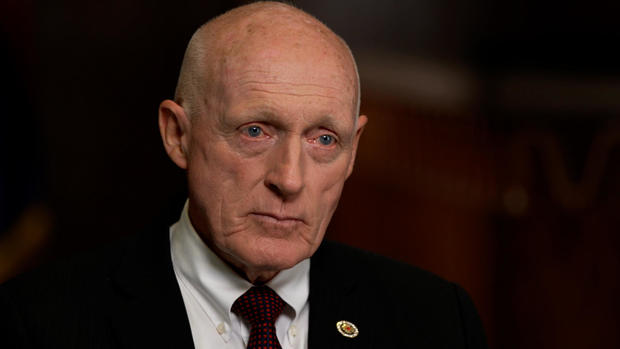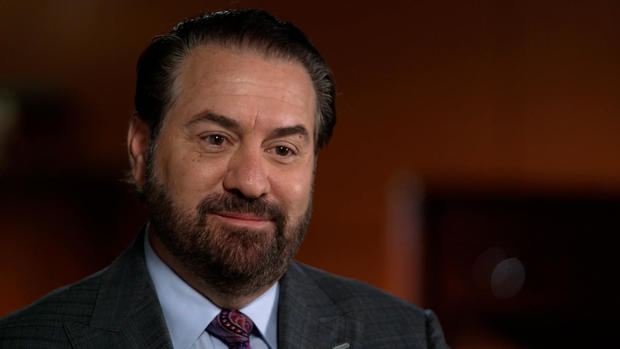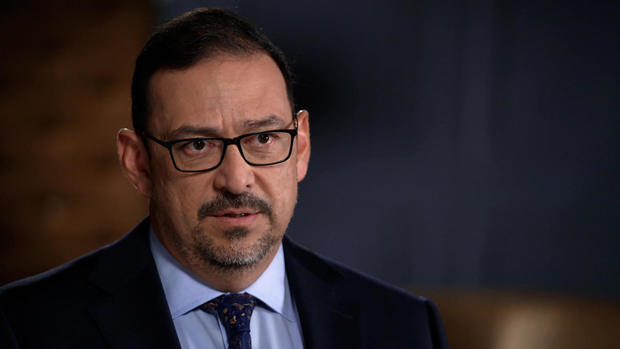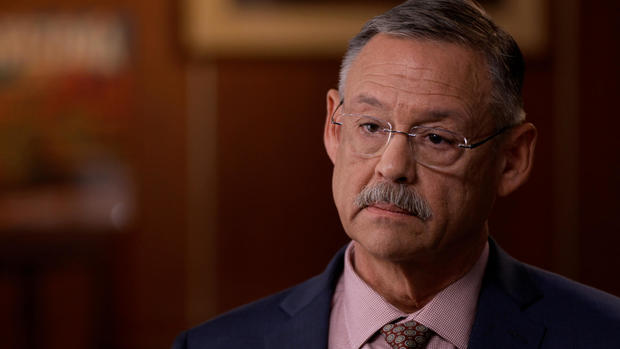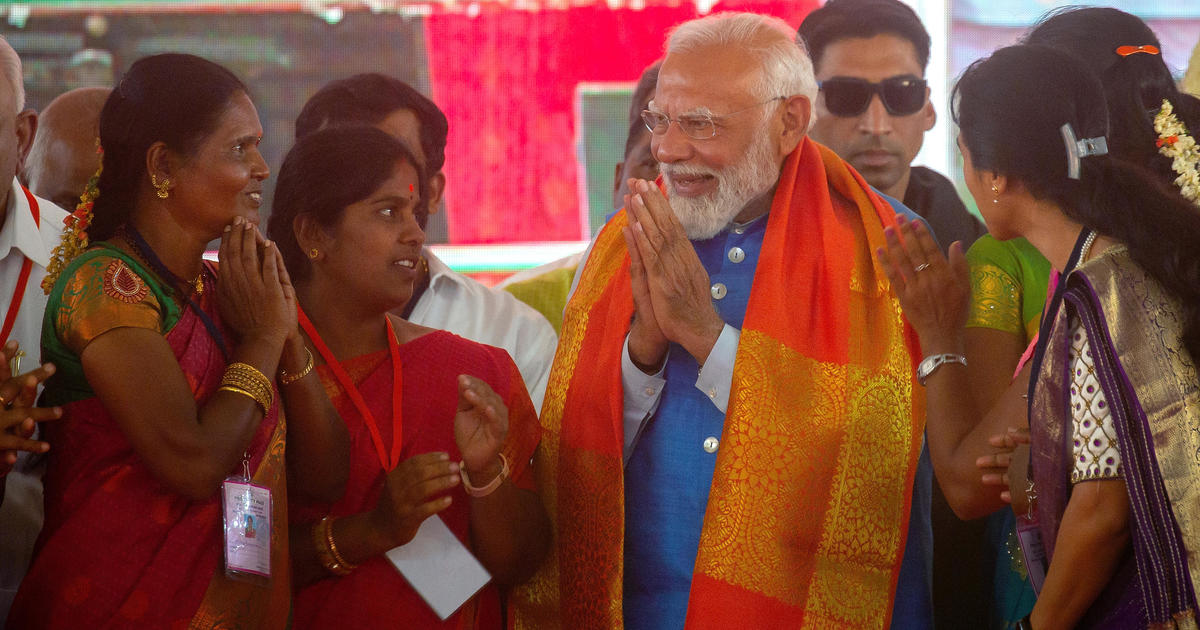Belief in the Ballot: Republicans in Arizona running on claims of election fraud
It's the vote that holds America together—belief that with a ballot voices are heard, disputes are addressed and there's always another chance. Countries without this belief tend to be in bondage or at war. Election Day is coming, but across America belief is under attack. Politicians who say the 2020 election was stolen are running for governor in 19 states; attorney general in 10; and in 12 states, election deniers are running for secretary of state, which would give them power over elections. After two years of investigations and audits no fraud or error has been found in any state that would change the 2020 outcome. But in 2022, spreading doubt has been key to an endorsement from Donald Trump. no state has been more deeply riven by this than Arizona where a split in the GOP has Republicans on opposite sides of a grand canyon.
On one side of the Arizona chasm stands Rusty Bowers, a life-long Republican and artist who became Arizona's speaker of the House. Bowers told us he was disappointed when Joe Biden won so when President Trump and Rudy Giuliani called, after the election, he was listening.
Rusty Bowers: First Rudy started. He said, "Well, there's been a lot of fraud all across the country and in Arizona," and then he listed off large numbers in categories that would be illegal. Dead people, stolen ballots.
Bowers says Giuliani wanted him to hold a vote to revoke Biden's electors.
Rusty Bowers: And I said, "But Rudy, I want the proof. You're gonna give me the proof?" And he said, "Yes."
So, Giuliani and co-counsel Jenna Ellis flew out to meet Bowers.
Scott Pelley: You left the meeting with Rudy Giuliani thinking what?
Rusty Bowers: That I wasn't happy. I said, "Okay. Timeout. Mr. Giuliani, you said you were going to bring me some proof. Names, et cetera of all of these people. Did you bring me the proof?" And he looked at Jenna Ellis and he said, "Do we have the proof? "And she said, "Yes, we do." "Well, do you have it with you?" "No. No. I--" "Where is it?" "Well, it might be back at the hotel room." And I said, "I asked you for the proof. You said you'd bring it. You're not bringing it. You're asking me to break my oath and make up something to pull electors and replace electors, which has never been done in the history of the United States. And I'm gonna try that on my state?"
Without Bowers, Giuliani found an ally willing to call the vote criminal, Arizona State Representative Mark Finchem.
Mark Finchem on November 30, 2020: It's exceedingly hard for me to place a label on what we've heard other than racketeering, good ol' fashioned mobster racketeering.
Four weeks after Mr. Trump's defeat, Finchem held an unofficial hearing featuring Giuliani.
Rudy Giuliani on November 30, 2020: A conspiracy that was hatched by the crooked leaders of the Democratic Party.
A day of allegations without credible evidence ended with this.
Mark Finchem on November 30, 2020: When Satan wants to extinguish a light, he will stop at nothing. So be on your guard, put on the full armor of God and be prepared to fight.
Mark Finchem fought. And now, the 65-year-old former police officer is the Republican nominee for Arizona secretary of state, which would give him authority over elections.
Mark Finchem on January 15, 2022: Ladies and gentlemen we know it and they know it. Donald Trump won!
But Mark Brnovich does not know it. He's Arizona's Republican attorney general who's investigated for two years and has a word for claims of fraud.
Mark Brnovich: "Horse****" And that's what it is. Most of it's horse****. And I've been trying to scrape-- scrape it off my shoes for the last year.
Brnovich supported Trump, who called him with advice.
Mark Brnovich: He goes, all you gotta do is say the election's fraudulent, and you will be a superstar. You'll be the most popular guy in America. And I told him, I said, Mr. President, I didn't become attorney general to be a star. I brought my star with me. And I don't need anybody, whether it's a former president, or any other person validating what I'm doing and why I'm doing it.
What he's doing is bringing indictments in every 2020 vote fraud case that he can back with evidence. All together, to date, from the general election, Arizona has indicted 12 defendants in cases involving a total of 12 ballots—12—statewide. Biden won arizona by 10,000.
Mark Brnovich: There was no one in this country that wanted to find evidence of fraud more than I did, but I thought it was important to systematically go through and say "no" this is the facts, this is the evidence, everyone is entitled to their own opinions but when you're an actual prosecutor, when you're the actual government, there's a higher obligation you can't afford to be sloppy.
In addition to Brnovich's investigations, in 2021, the Republican led state senate audited Phoenix's Maricopa County, home to 60% of the state vote. The audit was done by a company that had never audited an election. The audit's hand recount confirmed Joe Biden won. But its report also raised questions about discrepancies it found. Those questions were answered, online in detail, by Maricopa County. Still, widespread fraud is Mark Finchem's charge.
Mark Finchem on January 5, 2021: When you steal something, that's not really a win, that's a fraud.
That was in Washingtonm the day before the attack on the Capitol which finchem describes this way.
Mark Finchem on June 30, 2022: This entire J6 crap was manufactured to create a narrative that there was an assault on the Capitol. This fits into the Marxist ideology of how do you go to one party rule?
Today, Finchem is running neck and neck with his Democratic opponent, Adrian Fontes, who helped lead the 2020 election in Maricopa County.
Adrian Fontes: We are far too divided away from each other, based on lies and conspiracies. And we as election administrators across Arizona have to do a better job showing folks that the system is quite good.
Mark Finchem: I'd like to see a world where it's easy to vote but hard to cheat
We asked Finchem for credible proof of fraud. He raised, not evidence, but those questions from the state senate audit. Next, Finchem told us about a mysterious post-election e-mail which he featured in a rally.
Mark Finchem on October 9, 2021: Where we had a whistleblower who sent an email not just to the DOJ but to every single legislator saying there's 34-35 thousand fictitious voters and they've been inserted in the system where you'll never find them. Well, we believe we found them.
In the email Finchem speaks of, a 'Brian Watson' said Democrats added bogus votes, electronically, in Pima County. The writer had no evidence, asked not to be contacted and closed his email account.
Scott Pelley: Why would you give this any credence?
Mark Finchem: Again, it's an open question. I wanna know was there a possibility that this happened? Now we've now proven that it happens, Scott.
Scott Pelley: How so?
Mark Finchem: We've got two precincts that show over 100% of the people registered to vote in that precinct voted. That is an undeniable fact.
But it is deniable by Pima County, which says no precinct had more votes than voters. Another of Finchem's frequent points concerns a pair of indictments.
Mark Finchem on September 22, 2022: We have, for example, in Yuma County ballot harvesting and votes. I mean, we've got people who were indicted for the very thing that we are talking about right now who pled guilty. And frankly, those votes altered the outcome of Yuma County.
Mark Finchem: Yuma County we've actually had indictments and people that have pled guilty to ballot trafficking.
Scott Pelley: How many ballots were involved?
Mark Finchem: I don't know off the top of my head.
Scott Pelley: It's four.
Mark Finchem: 'Kay. Whether it's four or 4,000, doesn't matter.
Scott Pelley: It wasn't the presidential election; it was a primary.
Mark Finchem: Doesn't matter. It's a defect in the system.
A miniscule defect. Two women in Yuma County pleaded guilty to collecting four ballots and dropping them in a ballot box. It's against state law to deposit a ballot that isn't yours or your family's.
Scott Pelley: It's four ballots in a primary.
Mark Finchem: In that instance. In that instance.
Scott Pelley: You have a bigger one?
Mark Finchem: Well, we've got information that's been turned over to the attorney general's office and you say that there was nothing there. OK. Then I'm gonna have to live with that. But do I know for a fact that there were other ballot trafficking operations around the country and some in Arizona? Yeah, I do.
Scott Pelley: Name one.
Mark Finchem: Yuma County, 25,000 ballots.
Scott Pelley: What happened?
Mark Finchem: Same fingerprints on those ballots for five individuals. So where'd that go? Where's that evidence? I know it's been turned over to the attorney general's office. I know that the FBI field office actually did the prints.
That's false according to the FBI. Yuma County told us that no one in law enforcement fingerprinted 25,000 ballots. Finchem often says that evidence is with Attorney General Brnovich, implying that something big is coming.
Mark Finchem: In fact, he has a mountain of evidence that's sitting in his office.
But Brnovich told us his investigation is essentially over.
Mark Brnovich: We, as prosecutors, deal in facts and evidence. And I'm not like the clowns that throw stuff against the wall and see what sticks.
Scott Pelley: Clowns?
Mark Brnovich: Clowns. Did I say that? Yes, I think that there are a lot of clowns out there that-- they saw what they wanted to see. What is that Simon and Garfunkel line that-- "A man hears what he wants to hear and disregards the rest"? There's a lotta that going on.
It's going on in the top Arizona races where the Republican for governor is a denier.
Kari Lake on June 27, 2022: We had a fraudulent election, a corrupt election, and we have an illegitimate president sitting in the White House.
Mark Brnovich: It's like a giant grift in some ways.
Scott Pelley: A grift, a swindle, is what you're saying?
Mark Brnovich: Yes.
Scott Pelley: All of these accusations, the case in Yuma—scaremongering. The Brian Watson email—scaremongering. You called Arizona the epicenter of fraud, it's scaremongering. It's not the fraud that is breaking people's faith in our elections, it's people like you.
Mark Finchem: So you say. But when we look at the violations of state statute, this is the epicenter of the problem.
Nationwide, 190 election deniers are running for the U.S. House and 14 for the U.S. Senate, according to the Brookings Institution. Mark Brnovich lost his primary to a denier and so did Rusty Bowers, which may come as a relief.
Post-election, Trump supporters and conspiracy spinners laid siege to Bowers' home up to three times a week. He had to fend them off—a man with a pistol—demonstrators in their own armored car.
And at the state capitol, on January 6, 2021, they came with rifles and a guillotine. In Arizona, when belief in the vote eroded, this is what filled the void.
Scott Pelley: Has the Republican Party that you've known all your life been hijacked?
Rusty Bowers: It's a large group of them that is doing the hijacking. I just don't think it's a majority. Its effectiveness as a party and its legitimacy in public discourse is grossly undermined by how they've acted in this state.
Produced by Aaron Weisz. Associate producer, Ian Flickinger. Broadcast associate, Michelle Karim. Edited by Warren Lustig.
